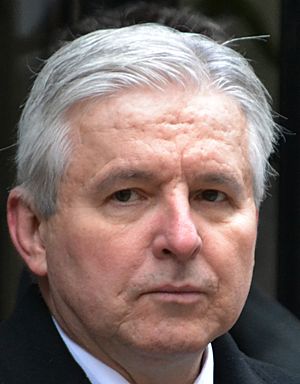Jiří Rusnok facts for kids
Quick facts for kids
Jiří Rusnok
|
|
|---|---|

Rusnok in 2013
|
|
| Prime Minister of the Czech Republic | |
| In office 25 June 2013 – 29 January 2014 |
|
| President | Miloš Zeman |
| Deputy | Jan Fischer Martin Pecina |
| Preceded by | Petr Nečas |
| Succeeded by | Bohuslav Sobotka |
| Governor of the Czech National Bank | |
| In office 1 July 2016 – 30 June 2022 |
|
| Appointed by | Miloš Zeman |
| Vice Governor | Mojmír Hampl Vladimír Tomšík |
| Preceded by | Miroslav Singer |
| Succeeded by | Aleš Michl |
| Minister of Industry and Trade | |
| In office 15 July 2002 – 19 March 2003 |
|
| Prime Minister | Vladimír Špidla |
| Preceded by | Miroslav Grégr |
| Succeeded by | Milan Urban |
| Minister of Finance | |
| In office 13 April 2001 – 15 July 2002 |
|
| Prime Minister | Miloš Zeman |
| Preceded by | Pavel Mertlík |
| Succeeded by | Bohuslav Sobotka |
| Personal details | |
| Born | 16 October 1960 Ostrava, Czechoslovakia (now Czech Republic) |
| Political party | Social Democratic Party (1998–2010) Independent (2010–present) |
| Alma mater | University of Economics, Prague |
Jiří Rusnok (born on October 16, 1960) is a Czech politician and economist. He served as the prime minister of the Czech Republic from June 2013 to January 2014. Later, from 2016 to 2022, he was the governor of the Czech National Bank.
Before becoming prime minister, Mr. Rusnok held important roles in the Czech government. He was the Minister of Finance from 2001 to 2002. Then, he served as the Minister of Industry and Trade from 2002 to 2003. President Miloš Zeman chose him to be prime minister on June 25, 2013. He took over after Petr Nečas resigned due to a big political problem.
On May 25, 2016, President Zeman appointed Mr. Rusnok as the fourth governor of the Czech National Bank. He took over from Miroslav Singer on July 1, 2016. His time as governor ended on June 30, 2022. Aleš Michl became the new governor on July 1, 2022.
Contents
Early Life and Education
Jiří Rusnok was born in Ostrava-Vítkovice, a city in the Czech Republic. He went to the University of Economics in Prague. He finished his studies there in 1984.
Political Career and Public Service
After university, Mr. Rusnok worked for government planning offices. In the 1990s, he became a director at the Czech-Moravian Confederation of Trade Unions. This was from 1992 to 1998.
He started his political journey in 1998. He joined the Czech Social Democratic Party (ČSSD). In June 2001, Prime Minister Miloš Zeman made him the Minister of Finance. He then became the Minister of Industry and Trade under Prime Minister Vladimír Špidla. However, he left this role and politics in March 2003. This was because he had disagreements with Mr. Špidla. After leaving politics, he worked in private companies.
Becoming Prime Minister
In June 2013, President Miloš Zeman appointed Mr. Rusnok as Prime Minister. He led a special kind of government called a caretaker government. This means it was a temporary government. Other political parties in the Czech Republic did not agree with this decision. They thought it was not a good idea. Some parties wanted early elections instead.
On August 7, 2013, the Chamber of Deputies did not support Mr. Rusnok's government. His cabinet received 93 votes in favor and 100 votes against. Seven members did not vote. A government needs more than half of the votes to be supported. After this vote, Mr. Rusnok said he would resign the next day. He believed this result would lead to new elections.
Leading the Czech National Bank
In 2014, President Zeman appointed Mr. Rusnok to the board of the Czech National Bank. This board has seven members. In 2016, he became the bank's governor. He took over from Miroslav Singer. This appointment was also made by President Zeman. In 2022, President Zeman chose Aleš Michl to be the next governor after Mr. Rusnok.
Other Important Roles
Jiří Rusnok has also been involved in other important groups:
- He was a member of the European Systemic Risk Board (ESRB).
- He served as an alternate member of the Board of Governors for the International Monetary Fund (IMF) starting in 2016.
Views on Economic Policy
Mr. Rusnok supports the idea of the Czech Republic using the euro currency. In 2014, he also agreed with the central bank's plan to make the Czech koruna (the Czech currency) weaker. This was done to help prevent prices from falling too much and to support the economy. The economy was recovering from a long period of slow growth at that time.
See also
 In Spanish: Jiří Rusnok para niños
In Spanish: Jiří Rusnok para niños
- Jiří Rusnok's Cabinet
 | James Van Der Zee |
 | Alma Thomas |
 | Ellis Wilson |
 | Margaret Taylor-Burroughs |

